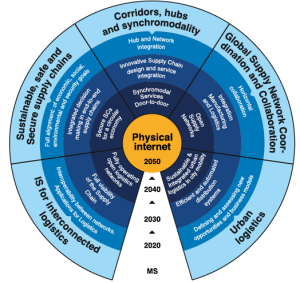
The European Technology Platform ALICE is set-up to develop a comprehensive strategy for research, innovation and market deployment of logistics and supply chain management in Europe. The platform support, assist and advise the European Commission into the implementation of the EU Program for research: Horizon 2020 in the area of Logistics. ALICE was officially recognized as a European Technology Platform by the European Commission in July 2013.
ALICE is based on the recognition of the need for an overarching view on logistics and supply chain planning and control, in which shippers and logistics service providers closely collaborate to reach efficient logistics and supply chain operations. ALICE engages with all different kind of stakeholders operating in the Logistics sector.
Vision
Future logistics will be based on an open global logistics system: (connecting logistics networks), founded on physical, digital, and operational interconnectivity (access to resources), enabled through modularization, standard interfaces and protocols, with the aim to move, store, produce, supply and use physical objects throughout the world in a manner that is economically, environmentally and socially efficient and sustainable. We call this vision the Physical Internet
Mission
- Development of new logistics and supply chain concepts and innovation for a more competitive and sustainable industry.
- The ambition is to contribute to a 30% improvement of end to end logistics performance by 2030
- ALICE, the ETP on logistics, aims to accelerate the deployment of more efficient, competitive and sustainable supply chains.
Activities/Output
- Define research and innovation strategies, roadmaps and priorities agreed by all stakeholders to achieve the ETP on Logistics vision. These items will assist the European Commission in the definition of Research and Innovation Programs, i.e. HORIZON 2020
- Foster innovation in logistics and supply chains, stimulating and accelerating innovation adoption in order to make possible the growth of the European economy through competitive and sustainable logistics.
- Raise the profile and understanding of new logistics technologies and business processes, monitoring progress and adjusting research and innovation roadmaps accordingly.
- Contribute to a better alignment and coordination of European, national, regional innovation programs in logistics.
- Provide a network for interdisciplinary collaborative research involving industry, academia and public institutions.
Who should participate
- Primary stakeholders: shippers and logistics service providers
- Other relevant stakeholders: transport companies, terminal operators, support industry (ICT, Consultancy), research and education
Alice Members
All these stakeholders are invited to join ALICE Working Groups on:
WG1 Sustainable, Safe and Secure Supply Chains
WG2 Corridors, Hubs and Synchromodality
WG3 Information Systems for Interconnected Logistics
WG4 Supply Chain Coordination and Collaboration
WG5 Urban logistics

Why become Alice member?
- Contribute needs and challenges to industry research and innovation in logistics and supply chain management, starting with Horizon 2020.
- Implement the outcomes of these programs in support of competitiveness and sustainability targets
- Access a network for interdisciplinary collaborative research involving industry, academia and public institutions.
- Be at the forefront of industry innovation, development and implementation.
- Have a role in developing regulatory requirements needed for innovation implementation
- Have the right to participate in the WGs and assembly as well as the option to be part of the Steering Group and recommend experts to participate in the different WGs.
ALICE A.I.S.B.L. Brussels, Belgium, www.etp-alice.eu; contact: info@etp-alice.eu
